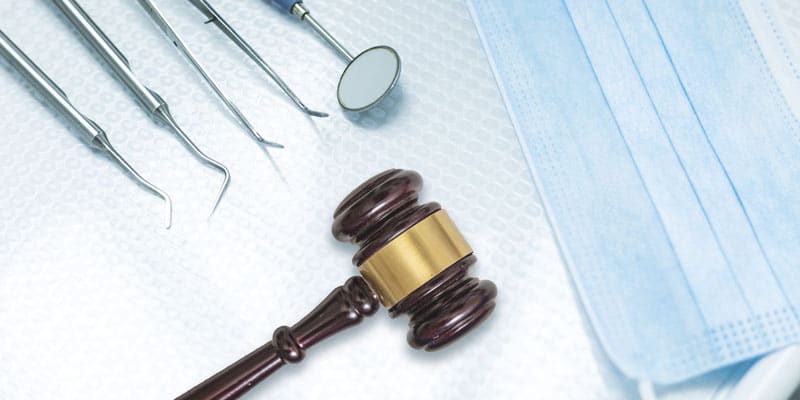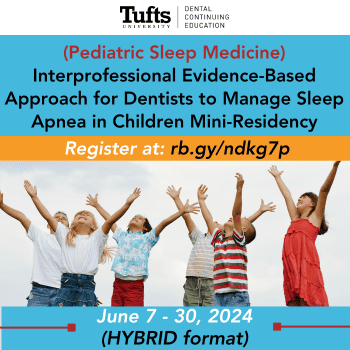In his new column, Daniel B. Brown, Esq. will focus on the legal aspects of the dental sleep practice.
 by Daniel B. Brown, Esq.
by Daniel B. Brown, Esq.
“So,” my dentist client explains to me, “I’ve got it all set up. It’s a sleep medicine practice. It’s beautiful!”
“Great,” I tell him. “We haven’t talked about this new idea. Tell me about it.”
“Here’s how it works,” he says. “A retiring sleep doctor two states over said he’d join me. We formed a new practice – 50/50.
“I’ll send my patients who complain of snoring to our new practice. The doctor will do a telehealth visit and I’ll do the home sleep test. The doctor will review the test and order the appliance.
“Then I’ll fit the patient and the practice will bill the patient’s health plan. I can’t wait to get started! I signed a five-year lease this morning. What do you think?”
“Well,” I said, “I think we need to contact your landlord and try to get you out of this lease.”
In all honesty, this conversation never happened. But I’ve been advising clients in the dental sleep medicine space for about ten years and I won’t be surprised if I get on a phone call one day along these lines.
That’s because dental sleep medicine is complicated. It must coordinate two different health professions in the testing, diagnosis and treatment of a single condition – obstructive sleep apnea. The sleep doctor operates in his or her own world of state and federal regulations. The dentist operates in a separate universe of laws and regulations, many of which are more restrictive than those of the medical doctor.
When a dentist files a claim for oral appliance therapy, insurance companies often reject the claim.
And thorniest of all for the dentist is getting paid for fabricating and fitting the oral appliance. The wizards who control reimbursement categorize oral appliance therapy as an item of Durable Medical Equipment (DME). That throws the dentist in the same pool as suppliers of oxygen, hospital beds, TENS units for chronic pain, and CPAP.
When a dentist files a claim for oral appliance therapy, insurance companies often reject the claim. Insurance plans could use a hall of mirrors approach to rejection – perhaps the dentist isn’t a contracted provider in the insurance plan, or the claim might be viewed as a sleep apnea disease matter and shunted off to the carrier’s medical division, who might deflect payment by saying that the invoice is a claim for dental services to be processed by the dental service division, who rejects on the ground that the invoice is for DME to be processed by the carrier’s DME section, who might send it to the dental section and start the merry-go-round again.
Getting paid for oral appliance therapy by Medicare invites its own pain. First the dentist must enroll in the Medicare program as a DMEPOS supplier. As a DME supplier, the dentist is subject to variety of restrictive supplier standards. Worse, the dentist becomes subject to the federal Anti-Kickback and Stark laws. This means that the dentist must thoroughly vet the financial arrangements, if any, with the referring sleep doctor.
For example, in the joint practice described by my hypothetical client above, the sleep doctor’s order of an oral appliance furnished by the dentist and billed by the practice to Medicare would likely violate the Stark law’s referral prohibition.
But that supposes that a dentist and physician are permitted by State law to practice together in the first place. Like I said, it gets complicated.
I’ve been asked by Dental Sleep Practice magazine to author a quarterly column addressing some of the legal issues facing dental sleep practitioners. I plan to address one or two regulatory topics in this column each issue. I hope you find these helpful.
Here’s a quick run-down of some of the issues I’ll address in upcoming columns:
- Corporate Practice of Dentistry. Most states prohibit lay persons or medical doctors from owning any part of dental practice or practicing medicine at a dental practice.
- Corporate Practice of Medicine. Most states prohibit lay persons or dentists from owning any part of a medical practice or practicing dentistry at a medical practice.
- Dental Service Organizations. This addresses when and how non-dentists participate in a dental sleep medicine business via a management services Some states make it hard. North Carolina, for example, requires that the proposed service agreements be submitted to the state for review and prior approval.
- Home Sleep Testing. Some states, like Georgia, absolutely forbid dentists from handling a home sleep test. Others are more lenient and allow dentists to perform home sleep tests as long as sleep doctors interpret the results.
- Teledentistry. Can the dentist work up an oral appliance via telehealth?
- Leased or Mobile Dentist Office. Can a dentist lease space from a sleep doctor to provide oral appliance therapy? Or can the dentist drive a van to the sleep doctor’s parking lot to fit the appliance?
- HIPPA. Sleep dentistry requires sharing of patient information. How does HIPAA apply?
- Fraud and Abuse. When and how do patient self-referral and anti-kickback laws apply to financial arrangements among sleep physicians and the dentist who furnishes the oral appliance.
- Dental Advertising Restrictions. Many state dental boards prohibit dentists from advertising a specialty, such as dental sleep, unless the dental board has taken action to recognize the
We will take a look at these items and more over the coming months. See you next time.
Legal aspects of the dental sleep practice are also considered in Dr. Bruce H. Seidberg’s article, “Risk Management Concepts for Dentists,” at https://dentalsleeppractice.com/2836/

 Daniel B. Brown is the principal health care attorney at Taylor English Duma LLP, a full-service law firm of over 150 attorneys headquartered in Atlanta, Georgia. Dan is an accomplished corporate and health care attorney who regularly advises clients on transactions and the legal and regulatory aspects associated with the operation and sale of health care businesses. Dan regularly advises physician practices, diagnostic facilities, sleep centers, dentists, DME suppliers and other health care providers in mergers, asset acquisitions, and joint ventures. He regularly assists clients on structuring health care business operations and maintaining regulatory compliance. He is a frequent speaker and author on the legal aspects of sleep medicine, home medical equipment, oral appliance therapy for obstructive sleep apnea, and other health law matters.
Daniel B. Brown is the principal health care attorney at Taylor English Duma LLP, a full-service law firm of over 150 attorneys headquartered in Atlanta, Georgia. Dan is an accomplished corporate and health care attorney who regularly advises clients on transactions and the legal and regulatory aspects associated with the operation and sale of health care businesses. Dan regularly advises physician practices, diagnostic facilities, sleep centers, dentists, DME suppliers and other health care providers in mergers, asset acquisitions, and joint ventures. He regularly assists clients on structuring health care business operations and maintaining regulatory compliance. He is a frequent speaker and author on the legal aspects of sleep medicine, home medical equipment, oral appliance therapy for obstructive sleep apnea, and other health law matters.